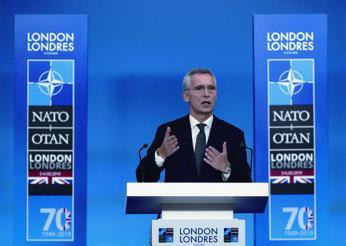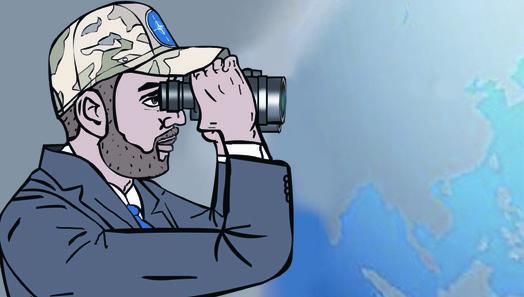Unfounded Worries
By Zhang Yi
At a summit commemorating NATOs 70th anniversary in London, the UK, on December 4, 2019, leaders of member states signed an unprecedented joint statement declaring that they “recognize that Chinas growing infl uence and international policies present both opportunities and challenges” that they need to address as an alliance. The meeting also approved an internal report outlining NATOs action plan for dealing with China-related issues, another fi rst.
Furthermore, ahead of the summit, NATO Secretary General Jens Stoltenberg said “the rise of China has security implications for all NATO members.” With the second largest military budget, according to Stoltenberg, China has a lot of new modern military capabilities, including intercontinental long-range missiles that can reach Europe and North America, which have changed the global balance of power.

The 29-member alliance was originally founded to counter the perceived threats from the Soviet Union during the Cold War and its line of defense was to extend only to Eastern Europe. But some NATO leaders like Stoltenberg claim that Chinas geopolitical influence is approaching the alliances borders, believing the development of the China-proposed Belt and Road Initiative is squeezing some of Europes traditional spheres of infl uence, such as the Arctic and Africa.
Chinas 5G technology has also been a cause of concern for many NATO members and allies. Cooperation with China on 5G was a major topic at the London summit.
The U.S. has pressed European countries to exclude Chinese tech company Huawei, a leading worldwide 5G equipment supplier, from the development of 5G networks on the continent. In the EU, there also remains widespread suspicion and mistrust of companies such as Huawei. A week before the summit, Germany said it would tighten rules on acquisitions of its hi-tech companies by non-EU companies.
Internal divisions
Southern and Eastern European countries have actually benefited from infrastructure projects under the Belt and Road Initiative. Consisting of the Silk Road Economic Belt and 21st-Century Maritime Silk Road, the initiative aims to build a trade and infrastructure network connecting Asia with Europe and Africa along and beyond the ancient Silk Road trade routes.
During Chinese President Xi Jinpings visit to Greece in November 2019, Greek Prime Minister Kyriakos Mitsotakis called the Piraeus Port, operated by China Ocean Shipping Co. Ltd., a model of bilateral cooperation, which created 10,000 jobs for local people. In addition, leaders of both Germany and France have called for uniform cybersecurity standards across the EU, affi rming that they would not maliciously boycott Chinese companies. Given these divisions, its hard for European countries to find a common ground on China.
The U.S. is an active proponent of the socalled “China threat.” Kay Bailey Hutchison, the U.S. Permanent Representative to NATO, said in an interview with U.S. media that Washington sees China as an existing threat and that it is time to bring China “into the rules-based order.” Later, U.S. Secretary of State Mike Pompeo urged NATO allies in a public speech to work together to confront a wide variety of emerging threats from Russia and China, arguing that European countries should not give control of their critical infrastructure to Chinese tech giants like Huawei or ZTE.
Pompeo also said the day before the London summit that the U.S. respects each nations right to set science policy, but that, along with European countries, it saw a common threat, presumably referring to China. Major U.S. media outlets had outlined beforehand that at the summit, U.S. President Donald Trump would prioritize winning NATO support for countering the “China threat,”and pressuring the EU to exclude Chinese companies from building 5G networks.

Unlike the U.S., most NATO members are reluctant to get involved in disputes with China over the South China Sea. In Stoltenbergs words, they dont want to create new adversaries. He has repeatedly said NATO does not want to be in an adversarial position with China.
The U.S. military budget is slated to be$718 billion for 2020, an increase of $33 billion over 2019, or about 5 percent, and is by far the largest in the world. The U.S. has the most to gain from putting the China “challenge” on the alliances agenda, according to some Western media outlets.
In an interview with The Washington Post, Michael OHanlon of the Brookings Institution said Trump has acted so unilaterally in his tariff showdowns with China and Europe that its hard to imagine any substantial strategic decisions being forged through a multilateral body such as NATO.
In addition, the EUs reluctance to continue to follow the U.S. is growing stronger. Some European scholars have proposed the mechanism of permanent structured cooperation in the defense field and a strengthened European defense fund as a way to wean Europe off of its dependence on the U.S.
NATO ‘brain dead?
French President Emmanuel Macron has stated several times that NATO is “brain dead” due to the lack of strategic cooperation among members. He criticized Turkey, a member state, for having gone out of its way to threaten NATOs security by buying an S-400 surface-to-air defense system from Russia, NATOs Cold War archenemy. Moreover, the alliance was not notifi ed in advance of either Turkeys military operation in Syria or the U.S. withdrawal from Syria, demonstrating a lack of internal coordination and cooperation within the organization.
The split over China-related issues has also refl ected NATOs underlying quandaries. It is unprecedented for NATO to design its policy toward China through a special report or create a new agenda concerning China. If, as Stoltenberg put it, this is “analyzing how to best respond to the challenges China poses in a balanced way,” it is actually a compromise between the two positions within NATO and an attempt by the organization to slow down its “brain death.”
After the end of the Cold War, NATOs functions transformed from responding to conventional security issues to more nonconventional ones. NATO seems to need a common “threat” to reconstruct its voice. Macron, however, pointed out at the summit that NATOs enemy is neither Russia nor China, but global terrorism.
The organization has not updated its strategic plan in the last decade. Its new plan is expected to be completed by 2020. Putting China for the first time on its agenda could help defi ne its political program and strategies. However, such a move will not necessarily promote internal cooperation. Some U.S. scholars believe that it will take a long time to formulate a unifi ed NATO policy toward China.
But perceptions of China within NATO are sharply divided. The U.S. views China as a strategic competitor, while Germany and France are more ambivalent. Europe has benefi ted greatly from Belt and Road cooperation, as well as having China as a major trading partner.
The question of whether NATO can unite will be determined by its own efforts, and can never be dealt with by creating imaginary enemies. The London summits outcome is not in line with the spirit of multilateral cooperation in the context of global governance, nor is it consistent with the trend toward peace, development and cooperation. It does not serve the fundamental interests of NATO member states, and only promises to stir up trouble.

